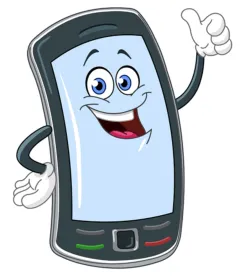Technology moves fast. The law…does not. Our legal system relies on history and precedent, and so it takes time (sometimes a lot of time) before judges and lawyers can figure out how to shoehorn new technology into existing law. But as much as lawyers might prefer things to stay the same, society continues to progress and the ways in which we communicate are no different. Today you can write someone, record a video, send a meme, or, as here, use emojis. So how does a court interpret an emoji? ¯\_(ツ)_/¯
The Case of the Optimistic Chipmunk
In Israel, a couple approached a landlord about renting his apartment. After touring the apartment and some back and forth, they texted the landlord the following:
This translates (roughly) to “Good morning ![]() We want the place
We want the place ![]() Just need to sit down to discuss the details…When is good for you?” The landlord then took the apartment off the market and continued negotiations with the couple until they abruptly cut off all communications with him. He eventually filed a lawsuit in small claims court for the damage that he suffered in keeping the apartment off the market on the couple’s behalf.
Just need to sit down to discuss the details…When is good for you?” The landlord then took the apartment off the market and continued negotiations with the couple until they abruptly cut off all communications with him. He eventually filed a lawsuit in small claims court for the damage that he suffered in keeping the apartment off the market on the couple’s behalf.
And while some might consider them mere silly pictures, here the case came down to the emoji. The judge ruled that these emojis “convey great optimism”[1] and, like the smiley faces that were used throughout the negotiations, “convey to the other side that everything is in order.” The couple’s use of those optimistic emojis was held to be misleading, given that the couple used them even though they were already doubting whether they would actually rent the apartment. By leading the landlord on, in part via those “festive” emojis, the court decided that the couple acted in bad faith and had to pay the landlord approximately $2,200.
Concepts to Consider Before Sending that Emoji
American courts are not bound by Israeli law, but the issues reflected in this case are also being litigated all over America. This won’t be the last case on emojis that you’ll see. So what can we draw from this case to use in our own personal and professional lives?
(1) Clear communication is important. The landlord here lost out on potential rental income because the couple wouldn’t tell him that they didn’t want to rent the apartment. Clear communication is especially important in any business negotiation.
(2) Your past actions can come back to haunt you. If you take a certain position on an important issue while negotiating a contract and then later try to flip your position, that can turn out badly for you. Don’t try to trick someone into contracting with you.
(3) Remember that your e-life is not private. Your texts, tweets, Facebook posts, and Snapchats can all be traced back to you and potentially used against you in litigation.
(4) Reasonable people can interpret things differently from how you intend. There are a few levels to this:
-
Written text doesn’t convey the nuance of face-to-face interaction. You might think that adding an emoji or emoticon like “;-)” to a message makes it clear that you were only joking, but others might read it differently.[2]
-
Emojis take this concept to another level entirely. In this case, the judge thought the use of a chipmunk was optimistic. But I knew someone in college who was horrified by squirrels and would not interpret that emoji in a positive manner (“It’s just something about their grabby little hands,” she said).
(5) Think hard about whether you want to use any kind of symbol in a business-related communication.
-
It’s a sensitive issue, but consider the generational gap between you and your audience. Everyone is different, but it’s reasonable to expect that someone under 25 might respond differently to the use of an emoji or emoticon than someone over 50. Is an eggplant emoji innocuous or salacious? Would you send it to your boss?
-
Nationality can also play a part in emoji interpretation. Does a panda carry the same connotations in Mexico and China? Does a winky face mean the same thing in both France and Delaware?[3] It may be in your best interest to stick to text in any professional communication.
The Most Important Lesson of All: Hire a Professional
What you say matters. So does the way that you say it. So if you’re doing something important, be it buying a house or closing a business deal, you should strongly consider using a professional as your go-between so that you can be sure that you and the other side can actually understand each other
If nothing else, your lawyer can tell you when it’s time to use ![]() instead of
instead of ![]() .
.




 />i
/>i

